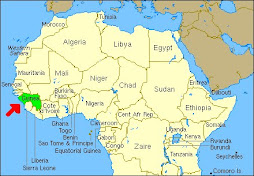Traveling across Haiti: headlights optional
There are a lot of things that are optional in Haiti, headlights maybe the least of those. After crossing this country and back, over a fair share of thought-jarring potholes, it sunk in why the average life expectancy in Haiti is in the range of 49 – 57.
Good life?
Yet, it’s possible to have a comfortable American-style life in Haiti. This can potentially be achieved by owning your own business, (as my neighbor does), being a corrupt leader, or funneling money from some foreign bank account or overseas employer. I’m choosing the latter.
I didn’t realize to what extent I’m living the good life here until my recent trip across the country. I would love to see the reactions of some of my persnickety former colleagues if they saw the hotels I stayed in. The roads out of Port-au-Prince are rough. We followed the coastline north, and you could see the Gulf de Gonave and the huge island of Gonave to the West, and fields and mountains to the East. Potholes did not slow our diligent driver, who was determined to get to Gonaïves by nightfall. I felt like my guts were getting in a blender! I don’t have a weak stomach, but I was glad I hadn’t had a lot to eat. Steve, my traveling companion, warned me that this road was far from the worst.
Haiti: dust or mud
Further in the North, I understood Steve’s point. Gaping holes covered the entire road, and were sometimes two feet deep. Worse than Mali, worse than the Northern Marianas roads. We drove at a pitching 12 mph for hours on the northern roads, near Cape Haitien. My first realization of my good life is that there were NO other private passenger vehicles out. I was congratulating myself for being tough/holding my lunch down, until the realization dawned that I was a blan in a private vehicle, with air conditioning if I so desired. All the other vehicles were overloaded taptaps or trucks. I saw busses with folks packed in like sardines, no standing room, and folks sitting on top, traversing the same sets of potholes at half the speed and far less comfort. (The taptaps are pick-up trucks where ppl jump on and off as needed. You just tap the back window to let the driver know when you want him to stop.) I’d be scared for my life pitching and tossing on continuous craters, perched on top of the cab of a truck, or hanging on the back bumper. Somewhere coming south between Cape Haitian and Gonaïves, I began to wonder about what the reaction would be of an average Haitian to the US interstate system. They’ve grown up on potholes and crowded taptaps. And what have I done differently to deserve guaranteed smooth rides at 70+ mph? I pay my taxes, yes, but so do they (if they have a job.) I’ve lived under a government that wasn’t setting aside $15 million a month into personal bank accounts in Switzerland (Merci, Duvalier.) These people have fought and fought again for good governance while I’ve done my minimal finger lifting at the voting booth. I’m not typically a patriotic person and deplore a lot of the US’s foreign policy. But I became a bit more grateful of living in the US, and the things folks have done ahead of me to keep Duvalier-style dictators out, and roads paved. The Haitians who handle hours of potholes everyday, poverty, and thatched roofs are a lot tougher than I am.
Forsaking the good life:
And then there’s Steve. He’s Fonkoze’s Education Director I mentioned in my earlier posting about Cite Soleil. He knows Haiti better than some Haitians because he lives it. Gradually over the course of our trip snippets about his lifestyle began to surface. First, he mentioned he didn’t like the hotel in Gonaïves because it was excessive—it had electricity. Like everyone else in his neighborhood, he doesn’t have electricity. “When it gets dark, I light a candle. I probably go through about 5 a week.”
After about 6 hours and having crossed much of the country without a bathroom, I was so relieved when at dusk the guys in the truck spotted a shady banana field where they wanted to “take a break.” So I darted into the banana field, “took a break,” and came back feeling grateful! I mentioned to Steve I now understood why several other women at Fonkoze said they just don’t drink water when they are traveling outside PAP. He replied, “Yeah, my mom told me later that the first time she came to see me in Haiti, she didn’t drink a thing the entire day before.” “Oh, you have no toilet?” “No. There’s a neighbor about 100m away who has a real toilet, ceramic and everything. My mom will only use full ceramic. There’s an outhouse not far from me. I’d rather have no plumbing than the bad plumbing.” Again, I was humbled. Even with the small lakes that collect either in my living room or in the bathroom of my apartment as a result of my indoor plumbing, I wanted nothing more than a shower at the end of this trip.
I don’t know if Steve gradually threw off the conventional trappings of an American life or if he dove in cold turkey. I also owe him my introduction to Haitian street food. Most blans will warn, don’t eat it! But Steve is a vegetarian, and speaks fluent Creole so can make sure he’s not getting 3-day old meat! The morning of our first meeting, we wandered outside the “university” and got coffee from a vendor standing in a muddy patch on the side of the road. Haitians roast the sugar at the same time they roast the coffee beans, so the coffee has a dark color and caramel-y flavor. It’s really sweet, you just drink it standing up for a whopping toll of about 20 cents, and hand the lady back your mug when you’re done. And it’s so much better than Starbucks! If only they offered a green leafy interior and Caribbean background music… We then moved across the dirt road and sat under a tree to eat some concoction of vegetables and a hard-boiled egg, deep fried in dough. Deep fried = delicious! In general, Steve eats a lot of rice, spaghetti, fried plantains. Fonkoze serves us lunch everyday. We blans get a special plate with vegetables and a minimum of meat delivered to our desks. The Haitians get a standard rice and beans, plus plantains. Unsurprisingly, Steve joins the Haitians on the benches outside for rice and beans.
Another note from Steve as we were almost home in PAP… by this time it was dark. “Do you go out often at night?” “Not so much.” “It’s a little scary when the headlights light up the air and you can see what you’ve been breathing all day.” It’s true that emissions controls are the least of Haiti’s worries. Most cities smelt thick of exhaust, and this coming only from public transportation vehicles—if Haitians drove as much as Americans do...! The road into Port-au-Prince seemed to vary between smells of putrid, burning putrid, and my favorite, wet putrid. At no extra charge, a healthy dose of dust to coat your face and hair (dreadlocks before you know it!!)
The cost of forsaking the good life?
If I ate deep fried dough everyday as opposed to vegetables, took my products daily to market on the Haitian roads, came home to no indoor plumbing, and shared a mattress with my four siblings, I understand why my lifespan would take a hit of 20 years. Steve noted that in the States, he had been a real health fanatic and a runner. Now, he surmises that other American colleagues here are decidedly healthier than he is.
The benefits of Steve’s Haitian lifestyle: He also shares a small room above the bakery in Cite Soleil. Rent is about $100 a year—occasional electricity (more when the gangs ruled the neighborhood, because the energy company was scared of them) no running water, bucket baths in the street. We dropped him off there yesterday when we got back to PAP. It was clear how much the neighborhood loves him, and the boys and men started swarming around and giving him hugs. He can identify with them better than anyone I’ve seen, because he is one of them. I went home and took a shower.
If I were to live here long term, would I protect myself from a Haitian reality and 49-year lifespan, under the umbrella of a good life that American money can buy? To be determined.

